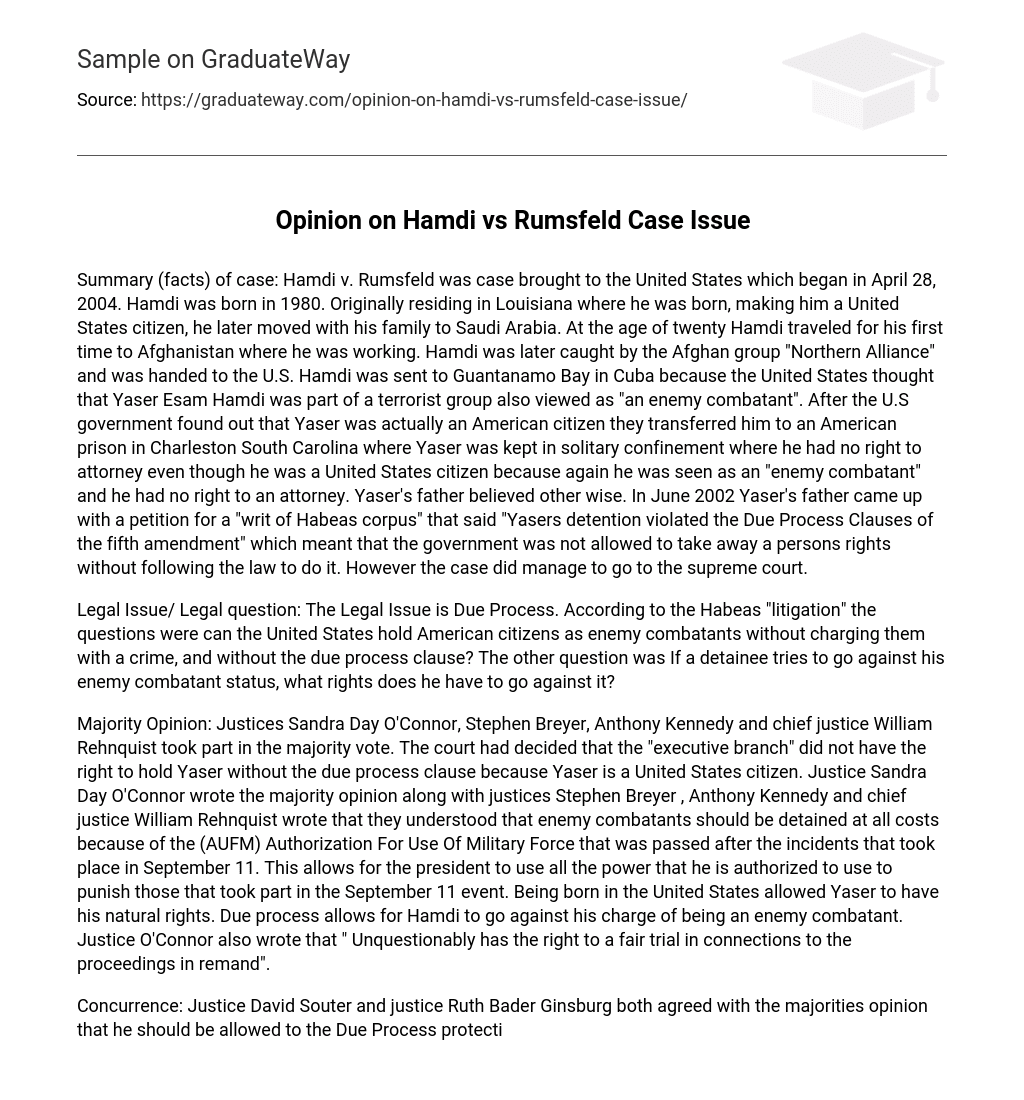Summary of the case: The case Hamdi v. Rumsfeld began on April 28, 2004. It involved Yaser Esam Hamdi, a US citizen born in Louisiana in 1980. Hamdi moved to Saudi Arabia with his family before going to Afghanistan at twenty for work. While there, he was captured by the “Northern Alliance” group and handed over to the US government. Initially taken to Guantanamo Bay in Cuba, Hamdi was deemed an “enemy combatant” as authorities believed he belonged to a terrorist organization. Upon discovering his American citizenship, he was transferred to a correctional facility in Charleston, South Carolina without legal representation due to his designation as an “enemy combatant”. Disagreeing with this decision, Hamdi’s father filed a petition seeking a “writ of Habeas corpus” in June 2002 claiming that his son’s detention violated the fifth amendment’s Due Process Clauses. Eventually, the case reached the Supreme Court.
Legal Issue/ Legal question: The Legal Issue at hand is related to Due Process in the context of Habeas “litigation.” Numerous inquiries were made regarding this issue, including whether the United States has the authority to detain American citizens as enemy combatants without bringing charges against them and without following the due process clause. Additionally, there is a question about the rights detainees have to challenge their enemy combatant status if they choose to contest it.
Justices Sandra Day O’Connor, Stephen Breyer, Anthony Kennedy, and Chief Justice William Rehnquist held a majority vote stating that Yaser, who is a US citizen, cannot be detained without due process by the executive branch. These justices acknowledged the significance of detaining enemy combatants under the Authorization for Use of Military Force (AUFM), which was implemented after the September 11 attacks. However, they stressed that Yaser has rights as a citizen and should have the opportunity to challenge his classification as an enemy combatant while being entitled to natural rights and due process. Justice O’Connor also affirmed Yaser’s undeniable right to a fair trial regarding the ongoing proceedings.
The court’s majority opinion was that Yaser should have the right to Due Process protection in order to defend himself against the charges. Justices Souter and Ginsburg agreed with this decision, while Justices Scalia and Stevens strongly opposed the executive power of detention. They believed that if Yaser were to be tried by Congress, it should follow regular criminal law.
Dissent: Justice Clarence Thomas dissented from the majority opinion, asserting that Yaser was a combatant and that executive powers should handle his case instead of the judiciary. Justices Scalia and Stevens also concurred that matters falling under other branches should not be interfered with by the court. Thus, it is appropriate for this case to be exclusively managed by executive powers without judicial involvement.
Discussion: The majority ruling was largely accurate. Yaser Hamdi, an American-born citizen, had his rights unjustly taken away, which is absurd. The years of captivity and transfer between prisons had detrimental effects on both Yaser and his family. While Yaser did not commit any specific actions, he happened to be in the wrong place at the wrong time. It is truly alarming for an American citizen to be detained by their own country without any evidence against them. The United States has a constitution in place to safeguard its citizens’ rights unless they violate the law. This situation mirrors the Bowers v.Hardwick case where two gay men were denied due process for engaging in consensual sexual activities. People’s personal choices should remain their own business, and America should refrain from controlling these choices unless they cause harm to others. The rights of individuals such as rapists, serial killers, and those who attempt to harm others can have their rights revoked.
However, before revoking their rights, there should be evidence proving the guilt of these individuals. Regardless of the circumstances, all these individuals are American citizens and have the right to defend themselves. Therefore, it is unjust to strip an American citizen of their rights without sufficient evidence. The decisions made by the executive powers in this case were highly flawed. Yaser’s almost two-year imprisonment felt like that of someone wrongly convicted, a truly terrible feeling. Many believed that it was the president’s responsibility to handle this situation, but creating unjust laws will not solve anything. Every American citizen is entitled to due process even if they were labeled as an “enemy combatant.” The nation was still gripped by fear from the aftermath of 9/11 which led to the implementation of unconstitutional regulations. Yaser had his citizenship renounced and faced travel restrictions without ever being charged, which was unfair. I fail to understand why Yaser’s citizenship would be revoked since he was not charged as an enemy combatant. Congress deemed it necessary to impose punishment on him for their own satisfaction despite the ongoing war on terror; however, it is important for the United States not to overlook people’s rights. The constitution guarantees that citizens are informed about their role in our government and fear should not undermine these rights.
In conclusion, despite the presentation of some valid arguments by the majority, I firmly oppose the unjust decision to revoke Yaser’s citizenship.
View as multi-pages





